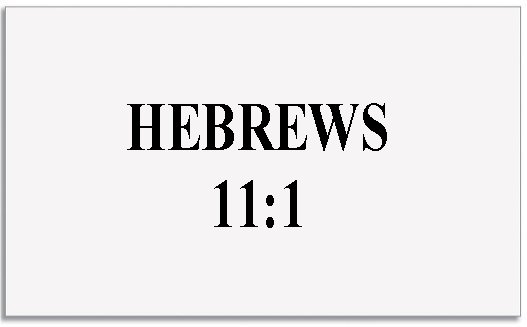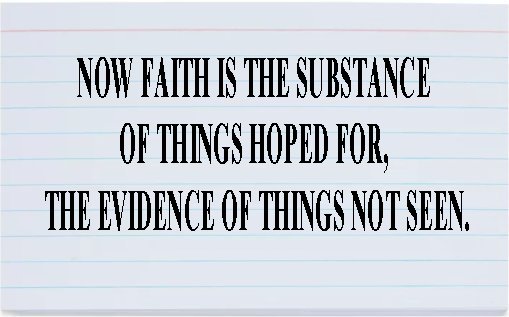| |
HEBREWS 11:1 “NOW FAITH IS THE SUBSTANCE OF THINGS HOPED FOR, THE EVIDENCE OF THINGS NOT SEEN.” (KJV, NKJV)
“Now faith is the assurance of things hoped for, the conviction of things not seen. (NASB, RSV)
“Now faith is being sure of what we hope for and certain of what we do not see.” (NIV)
“Now faith is the confidence in what we hope for and assurance about what we do not see.” (ESV)
“What is faith? It is the confident assurance that something we want is going to happen. It is the certainty that what we hope for is waiting for us, even though we cannot see it up ahead.” (TLB)
I believe Paul wrote these words. Hebrews doesn’t prove that to us, I just believe it. That fact is something I can’t readily see, but there is a lot of evidence in the writing to make me believe it so.
Like other writings of Paul, the sentence sounds a little mysterious, maybe ethereal in its meaning. After he makes this statement, he spends a lot of the following verses illustrating what faith is by the testimony of men and women mentioned throughout the Bible.
This fairly huge concept of the Bible is described as very important: “By it, others obtained a good testimony”, they “gained approval.” (Heb 11:2) Only by faith can we grasp the truth that God created the worlds “out of things that were not visible.” (Heb 11:3)
Hebrews 11:6 really puts the hammer to the nail by telling us that “without faith, it is impossible to please God”, because anyone who comes to Him must first “believe that He is” and then believe that He is a “rewarder to those who seek Him.” When we come to that drawing force, that invisible Person that we cannot see, we cannot have faith without believing that He IS, whether we can see Him or not. Only later do we learn about His rewarding us because we seek Him. It is unmistakable, however, that without faith, we cannot please God.
This concept really shouldn’t seem so foreign to us! We put our faith in things we cannot see every day. We cannot see the hearts of those who drive around us on the roads. But we trust, or at least have hope, that we will all obey the rules and laws of the road so we can coexist together without constant threat. When that proves to be successful, our assurance of what we hoped for is rewarded with staying alive.
When we meet someone that we fall in love with, we can’t see their love for us. But we take the risk every day when we express our love to them that they will return that unseen feeling, emotion or invisible substance of their love for us too. Nearly fifty years after I first confessed to my wife that I loved her, she has proven to me over and over that my love for her is returned. Bearing four of my children is a visible proof of the existence of that love…but even though I can’t touch it or see it, I know it is there.
There is that age old example is our demonstrated faith every time we sit down in a chair. Without consciously thinking about it every time we do it, we still admit that it is a fact that we hope for it to support us. More times than not, the substance of that hope is demonstrated by the chair not collapsing under me. I have a couple of examples in my life when that faith was mistakenly founded in a chair that did not earn that trust. Yet, I continue to hope for the strength of chairs that I sit in and it is rewarded by the substance of fact.
In every culture, we readily believe in the unseen. We love to read novels like “The Invisible Man” and imagine fiction to be possible. The Hollywood movie “Ghost” was easily accepted as almost fact, even though we know we cannot see Patrick Swazey, or any other person after he or she dies. We love to believe in the unseen. We watch the love and trust a child puts in its parents as daily, an affection is expressed to them that builds their trust in a bond they cannot see. Why then would we consciously choose not to believe in a God we have never touched? Despite historical evidence to His existence, why would we not immediately choose to trust a Savior who came and died for us, even though we weren’t alive to see it?
Ask the disciple Thomas that question when you see him. Don’t be too hard on his lack of faith though. Some of us might have had the same reluctance to believe. He said, “I won’t believe unless I put my hands in his wounds that came from His crucifixion.” Jesus accommodated Thomas. Jesus let Thomas believe by seeing and touching. But He also quickly made the point that blessed were those who would never see yet still believe. For the last 2,000 years, that has been folks like us. See John 20:24-29.
As I am getting older, like many others before me, I am going through lots of serious physical trials that seem like they shouldn’t be. I am constantly reminded that this growing old thing isn’t for sissies! Sometimes, I feel like I need an explanation for why I should hurt, why I should lose my love ones or why my life shouldn’t just pleasantly slide right into heaven.
Read the section written by Peter near the end of his life, amidst a lot of suffering. He reminded us in 1 Peter 1:3-12 that each Christian might have to suffer and “be grieved by various trials.” We might even find that the “genuineness of our faith might be tested by fire,” for one purpose: “that we might give praise, honor and glory to Jesus Christ” whom Peter reminds us, “whom having not seen, we love.” In the end, as a reward for that faith in Him whom we have never seen, we receive “the salvation of our souls.”
The Lord designed the nature of our faith. It pleases Him when He looks at us and sees our faith and trust in One we cannot see, but trust anyway. There is a reward for us in that when we get to heaven. We have a “blessed hope” when, like Abraham, we look for a city we have not seen “whose builder and maker is God.” That is true faith: putting trust in the substance of what we hope for, what the Word of God has told us is true. Although we cannot see it, touch it, measure it, we know by the testimony of those who have gone before us that the evidence is there that it is true. That’s faith. Without it we cannot see God. Without it we cannot please God. Without it, we will remain forever lost. Have faith in God!
Questions to Ponder: In a world increasingly influenced by scientific “proof,” how can we stand firm in a faith that demands we believe in things not seen? Isn’t it interesting that science which proposes theory and proof insists that we believe in the existence of things like molecules, atoms, sub-atomic particles that even they have never seen yet they know must be true. Meanwhile, theories like Darwin’s evolution of the species are treated as fact even though there has never been those established links between species that it proposed. Which is easier to believe? That we descended from primates or that an intelligent designer made the intricately balanced environment that our earth and the universe is, that is fit just for our needs? Hebrews 11:7 tells us that at the direction of God, Noah had enough faith in God that he built the ark although he had never seen a flood before. Is your faith in God enough to do whatever task He has given you to do in this life?
Other Scriptures to Consider: Read the entire chapter of Hebrews 11. Study the testimonies of so many before us who demonstrated what faith is supposed to be to us. Read 1 Peter 1:3-12. Interesting that Peter, like Paul, used the same terminology of never having seen Jesus, “we yet love and believe.” Read John 14:1-11 where Jesus speaks to the disciples about their futures and asks them to believe in what they could not yet see. Read John 17, Jesus’ “priestly prayer,” especially verse 20 where He prays for us, in the future, who would “believe in Him through their word.” He prayed for our faith as much as He did for that of His disciples. Mark 11:22, “Jesus said to them, ‘Have faith in God.’”
 
|
|




